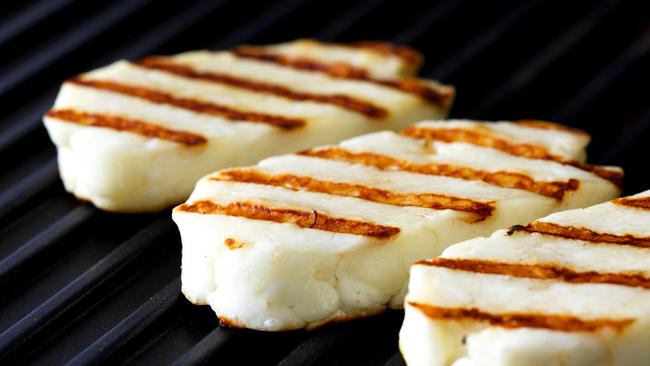Australian-made haloumi under threat as European Union claims name
The salty and squeaky cafe favourite is under threat as Europe adds it to the list of foods it is trying to claim.

Australian-made haloumi could be a thing of the past if the latest moves out of Europe are anything to go by.
The salty favourite is the latest food to be added to the European Union’s list of geographical indications – that is, exclusive names or branding used to show a product comes from or has links to a specific region.
Australian cheesemakers fear it’s a sign the EU will seek to forbid use of the term haloumi outside Cyprus, as part of its free trade negotiations with Australia.
The EU already wants 172 foods acknowledged as GIs in its free trade negotiations with Australia, including feta and parmesan.
Australian producers say losing use of the names would devastate their own trade, at home and abroad.
Speaking against the move, National Farmers’ Federation chief executive Tony Mahar said the GI regime was “a Trojan horse for European protectionism”.
“This is a negative outcome for Australian farmers, processors and consumers who now risk having their consumption choices needlessly limited by EU bureaucracy,” Mr Mahar said, adding that such restrictions could also lead to increased prices for consumers due to lack of competition.
It comes after Federal Trade Minister Dan Tehan this week did not rule out signing a free-trade agreement with Europe that includes granting European producers exclusive use of certain food names.
Mr Tehan vowed to keep working with industry at home to achieve a “balanced agreement” with the European Union but when it came to GIs, he would ensure “the ultimate outcome we’re getting for our agricultural exporters is a net beneficial one”.
Asked if that meant GIs could be sacrificed for an overall deal, Mr Tehan said: “It’s not a matter of being sacrificed, it’s a matter of working through with industry what could work and what won’t work”.
Mr Tehan made the comments during The Weekly Times’ VirtuAg webinar last week, when he confirmed he would travel to the EU and UK next month to further both sets of trade negotiations.
Mr Tehan also reiterated his view that the EU’s planned introduction of carbon border taxes – which would see tariffs applied to imports from countries perceived to be not doing enough to combat carbon emissions – could be used for protectionist measures.
“I think it’s very difficult to see how you can do it in a World Trade Organisation-consistent way,” Mr Tehan said.
Mr Mahar said Australia’s ag industry had embarked on trade negotiations in good faith but “the EU has continued to demonstrate their intention to extend their restrictions and impose more protectionist measures”.


